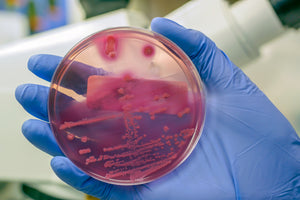Is it Glue, Is it Wrapping Paper? No, it’s Bacteria!
November 23, 2015

This November we’re Giving Thanks to Bacteria
During the past few months we’ve been talking about the benefits of probiotic bacteria in the animal kingdom but did you know that bacteria is proving to be beneficial in places where you just wouldn’t expect it? It is astonishing to think that bacteria was something we used to avoid, but that was well before we knew what we know now. Bacteria is incredibly smart, and you’ll be amazed when you read how bacteria are being used to improve the world around us from repairing concrete, cleaning up oil spills to detecting landmines. In fact, there’s lots of ways bacteria improves our lives. Here’s just a few of our favorites, and hey — thanks bacteria!
Bacteria Repairing Concrete
Students in Britain have engineered bacteria to act as “glue” for cracked concrete. The bacteria is triggered into activity when it senses the specific pH of concrete, then it reproduces until it fills the crack, hits the bottom of the fissure and starts to clump. After the clumping begins, the bacterial cells divide into three types, one that produce calcium carbonate, one that acts as reinforcing fibers, and one that acts as glue. Together, the cells become as strong as the concrete they’re filling. Don’t worry, these bacteria can only survive when they comes in contact with concrete, which means they won’t go taking over the world, but they may help reduce carbon dioxide emissions from concrete production.
Bacteria Detecting Landmines
We know that beneficial bacteria can keep us healthy, but a team of scientists have discovered a way that it can keep us safe. The DNA of bacteria is manipulated and mixed into a colorless solution that can be sprayed in suspected landmine areas. Using this technique called Biobricking, the bacterial mixture glows when it is close to a landmine. The bacterial solution forms green patches when it comes into contact with the soil and will begin to glow if it’s next to an undetonated explosive. Detection and eradication of landmines is a serious global concern and this is a step in the right direction to destroying them safely and saving lives.
Detecting Pollution
Similar to bacteria glowing if it’s next to an undetonated explosive, researchers have also discovered that bacteria can help detect pollution on land and sea by glowing if it comes into contact with certain chemicals. The technology could be incorporated into buoy-based devices, or used for detecting other pollutants in water sources and foods.
Cleaning Oil Spills
Oil spills happen and, unfortunately, they have a negative impact on our natural environment. Clean up can be extremely difficult and both economically and environmentally costly. Marine bacteria that break down and remove the oil is just one solution, but scientists are now discovering that a process called Bioremediation which combines the use of specific plants, bacterial decomposers and enzymes can be used to remove contaminants and restore balance after an oil spill. According to Roman Netzer, a researcher and biologist at SINTEF, he believes “that in time we will be able to make capsules which can attach themselves to rocks along the shoreline. These will provide the bacteria with ideal growing conditions by releasing nutrients as and when needed.” This is nature’s way of clearing up the problem.
Growing Packaging
Bacteria could be the answer for transporting goods especially those that are fragile and hard to wrap. A project called Bacs uses a bacteria called Acetobacter xylinum that wraps itself around an object. It grows into a bio-degradable paper-like protective shell. So by covering a fragile object with a bacterial culture, feeding it something sweet, and giving it some time to grow, you don’t have to worry about finding the right shipping materials again especially for those odd shape packages. Now, if they can devise a method for keeping it temperature cold, we’ll use it to ship your order.
Bacteria as Data Storage
Scientists in Hong Kong have figured out a way to store data inside E. coli, from text to possibly even photos and videos. One single gram of bacteria can store more information than a giant 900 terabyte hard drive! That means these bacteria have almost 500 times the storage capacity of a top of the line commercial hard drive. They have figured out how to compress data, store it in chunks in several organisms, and map the DNA so the information can be easily retrieved, similar to a filing system. They’re calling it biocryptography. According to the researchers, this may revolutionize how we store data, and what’s more, the information can’t be hacked.
We’re amazed at these examples. There are so many remarkable things happening in the scientific community that it’s hard to pick which ones to talk about.
The post Is it Glue, Is it Wrapping Paper? No, it’s Bacteria! appeared first on Natren Probiotics Blog.





Leave a comment